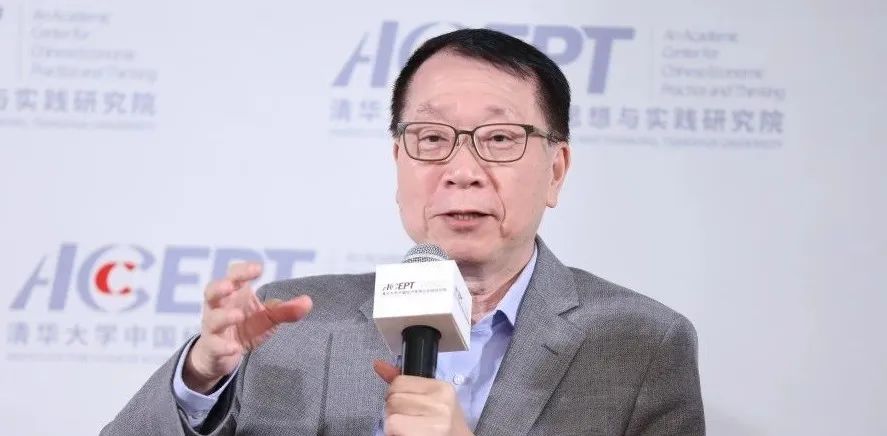Francis T. Lui: Hong Kong's economy shaken by pandemic, but recovery provides glimmer of hope
The following is a summary of Francis T. Lui's comments during a roundtable discussion at the 45th Tsinghua University Forum on China and the World Economy held at Tsinghua University, Beijing, on June 17, 2023. Lui is Professor Emeritus and Adjunct Professor at the Hong Kong University of Science and Technology’s Department of Economics.
On June 17, 2023, the 45th Tsinghua University Forum on China and the World Economy, hosted by Tsinghua University's Academic Center for Chinese Economic Practice and Thinking (ACCEPT) in partnership with the university's School of Social Sciences and School of Economics and Management, was held on campus. Professor Emeritus and Adjunct Professor at the Hong Kong University of Science and Technology’s Department of Economics, Francis T. Lui, participated in a roundtable discussion at the forum alongside other distinguished guests where he commented on the current state of China’s economy.

On June 17, 2023, the 45th Tsinghua University Forum on China and the World Economy was held inside the Weilun Building’s main lecture hall on campus at Tsinghua University’s School of Economics and Management. The biannual event was hosted by Tsinghua University’s Academic Center for Chinese Economic Practice and Thinking (ACCEPT) under the theme of "2023 Mid-Year Economic Outlook." During the forum’s proceedings, Francis T. Lui, Professor Emeritus and Adjunct Professor at the Hong Kong University of Science and Technology’s Department of Economics, participated in a roundtable discussion alongside other distinguished guests where he commented on the current state of China’s economy.
Hong Kong's economy performed comparatively poorly last year, with its GDP having contracted by -3.5%, while this year the region’s growth rate is broadly forecasted to reach somewhere between 3% and 3.5%. At present, the labor pool in Hong Kong is in short supply, as many young people lack the willingness to actively engage in productive work. Young people's values underwent a shift during the pandemic, with many choosing to live with and depend on their parents or otherwise “lie flat” (i.e., opting out of the rat race) while collecting government benefits, living in a state characterized by low wages and low consumption. Meanwhile, Hong Kong's housing prices remain high, and because people will lose their eligibility to enjoy the benefits of government-subsidized public housing after receiving a wage hike above the stipulated income limit, this has also contributed to a lack of enthusiasm towards work among many of the gainfully employed.
At the same time, the demographic situation in Hong Kong is a matter of serious concern. Residents living in the region have demonstrated a low willingness to have children, with around 40% of 45-year-old women being childfree and with the number of adults without children continually increasing. There are two reasons for this trend: first, Hong Kong is geographically small and so housing is expensive, meaning that there is not enough room to adequately house more children; and second, the cost of high-quality education is too expensive. If this trend continues, it will undermine Hong Kong's long-term prospects for economic development.
For the moment, however, Hong Kong is not without its own unique advantages and development opportunities. For example, against the backdrop of the weaponization of the American dollar by the United States, many individuals and regions around the world, such as the Middle East, have reduced their willingness to hold U.S. dollars, while the currency pegging of the Hong Kong dollar to the U.S. dollar has meanwhile presented an enormous risk and has become a problem in search of a solution. As a financial center and the world's largest offshore RMB business hub, Hong Kong accounts for the greatest share of offshore RMB deposits, and is well positioned to increase the volume of RMB transactions as well as introducing new RMB investment products, in this way further enhancing its financial development.
In terms of the inflow and outflow of human resources, Hong Kong is facing a difficult situation when it comes to the emigration of high-skilled labor. That said, the region also retains the capacity to bring in many overseas talents, although its efforts need to be redoubled to attract them. For instance, despite Hong Kong having a high average life expectancy, there has been an ongoing shortage of doctors. In order to avoid excess competition, the region was reluctant in the past to open its door to doctors from the mainland, but this resistance has now largely dissipated, with mainland talents meanwhile being very much interested in relocating to Hong Kong.
The pandemic triggered enormous negative shocks, with these reverberations bound to create problems for the post-pandemic economic recovery. In any case, a time of crisis invariably gives rise to fresh possibilities, so Hong Kong will need to take advantage of any or all new opportunities if it is to enhance its economic growth potential moving forward.




